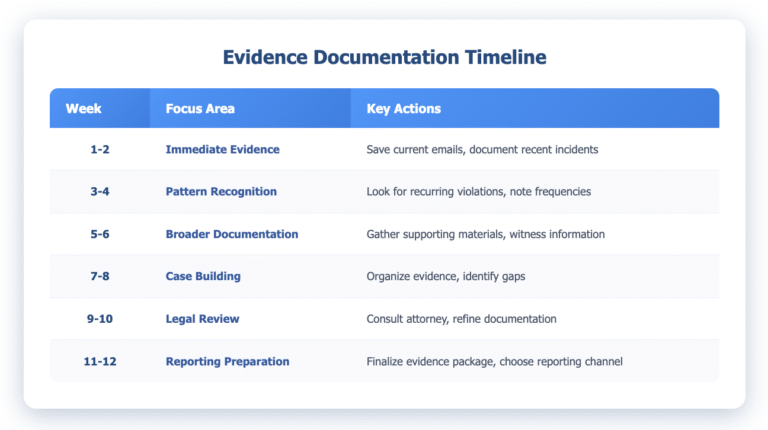When you witness workplace wrongdoing, your first instinct might be to gather proof immediately. But hold on—collecting evidence as a potential whistleblower requires careful strategy to protect both your legal rights and your career. The evidence you preserve can make or break your case, but gathering it improperly can land you in serious legal trouble.
This guide walks you through the legal methods for documenting workplace violations, what evidence strengthens whistleblower claims, and how to protect yourself throughout the process. You’ll learn the difference between smart documentation and risky evidence collection that could backfire.
Disclaimer: This article provides general information for informational purposes only and should not be considered a substitute for legal advice. It is essential to consult with an experienced employment lawyer at our law firm to discuss the specific facts of your case and understand your legal rights and options. This information does not create an attorney-client relationship.
Understanding the Legal Landscape for Evidence Collection
Before you start documenting anything, you need to understand what you can legally collect. Whistleblower protection laws shield you from retaliation for reporting wrongdoing, but they don’t give you carte blanche to access any information you want.
Your evidence-gathering rights depend on several factors: your job responsibilities, the type of information involved, and your company’s confidentiality policies. Generally, you can document information you encounter during your normal work duties, but accessing materials outside your regular scope requires more caution.
The key principle: collect evidence you’re legally entitled to see or that’s already available to you through your job. This includes emails sent to you, documents you work with regularly, and observations you make during normal business activities.
Types of Evidence That Strengthen Whistleblower Cases
Not all evidence carries equal weight in whistleblower cases. Understanding what investigators and attorneys value most helps you focus your documentation efforts effectively.
Financial Records and Documentation: Financial irregularities often provide the strongest foundation for whistleblower cases. This includes budget manipulations, fraudulent billing practices, kickback arrangements, or improper use of funds. Document specific amounts, dates, and the parties involved whenever possible.
Electronic Communications: Emails, text messages, and internal messaging systems frequently contain smoking-gun evidence of wrongdoing. These communications often reveal intent, knowledge of violations, and attempts to cover up problems. Save messages that show supervisors directing illegal activities or acknowledging known violations.
Policy Violations and Safety Issues: Document instances where company policies are systematically ignored or where safety regulations are violated. This includes maintenance records, inspection reports, training documentation, and incident reports that reveal patterns of non-compliance.
Witness Information: Keep track of colleagues who witnessed wrongdoing or have relevant information. Document conversations carefully, noting dates, locations, and exactly what was said. However, be careful not to actively recruit witnesses in ways that could appear as solicitation or conspiracy.

Digital Evidence Preservation Techniques
Digital evidence requires special handling to maintain its legal integrity. Improper collection or storage can render electronic evidence inadmissible or legally problematic.
Email and Electronic Communications: Forward relevant emails to your personal account, but only if they were sent to you or you’re copied on them. Screenshot email threads that might be deleted, ensuring the full header information (sender, recipient, date, time) is visible. For internal messaging platforms, document conversations through screenshots rather than trying to export data.
Document Preservation: Print important documents you have legitimate access to, or save them to personal storage if your company policies allow. Be careful with cloud storage—some companies monitor employee access to shared drives and documents. Create a separate folder on your personal computer for whistleblower-related materials and password-protect it.
Financial and Database Information: If your job involves financial systems or databases, document irregularities through screenshots or printouts of screens you’re authorized to access. Don’t attempt to run special reports or access areas outside your normal responsibilities. Focus on information that naturally comes across your desk.
Digital Evidence Preservation Techniques
Subtle Forms of Retaliation
Performance-Based Retaliation: Suddenly receiving negative performance reviews after years of positive feedback, being held to different standards than colleagues, or having your work subjected to unusual scrutiny.
Social Retaliation: Being excluded from meetings, having colleagues instructed not to work with you, or experiencing a hostile work environment from management.
Economic Retaliation: Reduced hours, eliminated overtime opportunities, passed over for promotions, or having benefits modified.
Constructive Discharge: Making working conditions so intolerable that you feel forced to quit. Courts recognize this as equivalent to termination under anti-retaliation laws.
Digital Evidence Preservation Flowchart

What NOT to Do When Collecting Evidence
Understanding the boundaries of legal evidence collection is just as important as knowing what to gather. Crossing these lines can destroy your whistleblower case and expose you to criminal charges.
Never Access Unauthorized Information: Don’t hack into systems, use someone else’s login credentials, or access files outside your job responsibilities. Even if you discover evidence of serious wrongdoing, illegally obtained information can’t be used and may result in criminal charges against you.
Avoid Soliciting Others: Be careful about asking colleagues to provide information or documents they’re not supposed to share. This can be interpreted as a conspiracy or solicitation. If coworkers volunteer information, document it carefully, but don’t actively recruit them to violate company policies.
Don’t Violate Confidentiality Agreements: Legitimate confidentiality agreements remain enforceable even for whistleblowers, though there are exceptions for reporting illegal activities to government agencies. Consult with an employment attorney before sharing confidential information to ensure you’re protected.
Documentation Timeline and Strategy
Effective evidence preservation follows a strategic timeline that balances thoroughness with personal protection. Start with the most accessible evidence and gradually build your case.
Immediate Actions (First 1-2 Weeks): Begin with information readily available to you through normal work activities. Save relevant emails, document conversations, and note patterns you observe. Create a secure filing system and establish regular documentation habits.
Building Your Case (Weeks 2-8): Expand your documentation to include broader patterns and additional evidence types. Look for corroborating information that supports your initial observations. Begin considering whether to report internally or externally.
Pre-Reporting Phase (Weeks 6-12): Compile your evidence into an organized presentation. Consider consulting with an employment attorney to review your documentation and advise on reporting strategies. Ensure you have sufficient evidence to support your claims before making any reports.

Protecting Yourself During Evidence Collection
Gathering evidence as a potential whistleblower carries inherent risks. Smart protection strategies help minimize your exposure while building a strong case.
Maintain Normal Work Patterns: Continue performing your regular job duties at the same level. Sudden changes in behavior, productivity, or access patterns may alert supervisors that something is different. Document wrongdoing as part of your normal workflow rather than making special efforts that could be noticed.
Create Contemporaneous Records: Document incidents as they happen rather than trying to reconstruct events from memory later. Keep a daily log of relevant activities, conversations, and observations. Contemporary documentation carries more legal weight and appears more credible than after-the-fact reconstruction.
Secure Your Evidence: Store documentation in multiple secure locations. Keep copies at home, in cloud storage with strong passwords, and consider giving copies to a trusted friend or family member. If your employer discovers your documentation efforts, they might attempt to confiscate or destroy evidence.
Common Evidence Preservation Mistakes
Learning from common mistakes helps you avoid pitfalls that weaken whistleblower cases or create legal problems.
Insufficient Documentation: Many potential whistleblowers document isolated incidents without establishing patterns. Single instances of wrongdoing are harder to prove and less likely to result in successful cases. Focus on building a comprehensive picture rather than relying on one or two incidents.
Poor Organization: Disorganized evidence is difficult for investigators and attorneys to review effectively. Create a logical filing system with clear dates, categories, and summaries. Well-organized documentation demonstrates credibility and makes it easier for others to understand your case.
Waiting Too Long: Evidence has a way of disappearing, especially electronic records. Companies routinely purge old emails, dispose of documents, and update systems in ways that eliminate historical information. Start preserving evidence as soon as you recognize potential wrongdoing.
Working with Legal Counsel
Employment attorneys who specialize in whistleblower cases can provide invaluable guidance on evidence preservation. They understand the legal requirements for different types of whistleblower claims and can help you avoid costly mistakes.
When to Consult an Attorney: Consider legal consultation early in your evidence-gathering process, especially if you’re dealing with complex regulatory violations or significant confidentiality concerns. An attorney can help you understand the boundaries of legal evidence collection and advise on reporting strategies.
Privileging Your Communications: Once you establish an attorney-client relationship, your communications about evidence and strategy become privileged. This protection ensures that your discussions with counsel remain confidential, even if your employer later investigates your activities.
Strategic Case Development: Experienced whistleblower attorneys can help you identify the strongest evidence for your specific type of claim and connect you with the most appropriate reporting channels. They understand how different agencies evaluate evidence and what documentation carries the most weight.
Evidence Preservation Checklist
Use this checklist to ensure you’re documenting evidence effectively while protecting yourself legally:
Initial Evidence Collection
- Identify information within your normal job access
- Create secure storage for documentation
- Begin contemporaneous written records
- Save relevant emails and communications
- Document patterns, not just isolated incidents
Ongoing Documentation
- Maintain regular work performance
- Continue normal access patterns
- Back-up evidence in multiple locations
- Keep a detailed timeline of events
- Note potential witnesses and corroborating sources
Legal Protection
- Understand your company’s confidentiality policies
- Consult an employment attorney if needed
- Avoid accessing unauthorized information
- Document evidence legally available to you
- Prepare an organized case file for reporting
Moving Forward with Your Evidence
Once you’ve gathered substantial documentation of workplace wrongdoing, you face the critical decision of how to proceed. The evidence you’ve preserved becomes the foundation for reporting violations and seeking protection under whistleblower laws.
Your next steps depend on the type of violations you’ve documented and your company’s internal reporting procedures. Some situations call for internal reporting first, while others warrant direct contact with regulatory agencies. The strength and organization of your evidence will significantly impact the success of any reporting you choose to pursue.
Remember that whistleblower protection laws provide strong anti-retaliation safeguards, but only if you follow proper procedures and report violations through appropriate channels. The evidence preservation work you’ve done creates the foundation for these protections to apply effectively.
Take Action to Protect Your Rights
Preserving evidence in whistleblower cases requires careful strategy and legal knowledge. If you’ve witnessed workplace wrongdoing and need guidance on documenting violations properly, don’t navigate this complex process alone.
At Nisar Law, we help employees understand their rights and options when facing workplace violations. Our experienced employment attorneys can review your situation, advise on evidence preservation strategies, and help you understand the best path forward for reporting wrongdoing while protecting your career.
Contact us for a confidential consultation to discuss your specific situation and learn how to document workplace violations effectively while safeguarding your legal rights.


